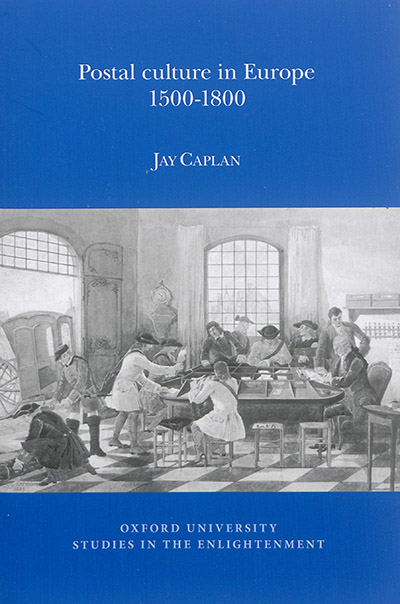en savoir plus

Carte fidélité
Permet à tous ses détenteurs d'obtenir 5% de réduction sur tous les livres lors du retrait en magasin (réduction non cumulable avec les réductions de type étudiant).
Offre également un certain nombre d'avantages auprès de nos partenaires.
Wishlist
Avec les favoris, retrouvez dans un espace les sélections effectuées au fur et à mesure de vos navigations dans le site.
Constituez pour votre usage personnel vos listes de livres en prévisions d'achats futurs et votre sélection d'articles, dossiers, événements, vidéos ou podcasts préférés ou à découvrir plus tard...
Il suffit simplement de cliquer sur "Ajout Favori" sur chaque page qui vous intéresse pour les retrouver ensuite dans votre espace personnel.
Requiert un compte Mollat
Mes Alertes
Requiert un compte Mollat
Postal culture in Europe : 1500-1800
Auteur : Jay Caplan
en savoir plus
Résumé
Une histoire des débuts et de l'évolution des services postaux en Europe, entre 1500 et 1800. L'auteur analyse le fonctionnement des divers systèmes mis en place, montre leur influence sur les usages de la communication et sur la perception du monde et définit l'apparition de la notion de service public et de vie privée. Elle s'attache particulièrement à la situation de la France. ©Electre 2024
Lire la Quatrième de couverture
Réduire la Quatrième de couverture
During the early modern period the public postal systems became central pillars of the emerging public sphere. Despite the importance of the post in the transformation of communication, commerce and culture, little has been known about the functioning of the post or how it affected the lives of its users and their societies. In Postal culture in Europe, 1500-1800, Jay Caplan provides the first historical and cultural analysis of the practical conditions of letter-exchange at the dawn of the modern age.
Caplan opens his analysis by exploring the economic, political, social and existential interests that were invested in the postal service, and traces the history of the three main European postal systems of the era, the Thurn and Taxis, the French Royal Post and the British Post Office. He then explores how the post worked, from the folding and sealing of letters to their collection, sorting, and transportation. Beyond providing service to the general public, these systems also furnished early modern states with substantial revenue and effective surveillance tools in the form of the Black Cabinets or Black Chambers. Caplan explains how postal services highlighted the tension between state power and the emerging concept of the free individual, with rights to private communication outside the public sphere. Postal systems therefore affected how letter writers and readers conceived and expressed themselves as individuals, which the author demonstrates through an examination of the correspondence of Voltaire and Rousseau, not merely as texts but as communicative acts.
In this book Jay Caplan provides readers with both a comprehensive overview of the changes wrought by the newly public postal system, and a thought-provoking account of the expectations that have led to our culture of instant communication.
Fiche Technique
Paru le : 11/04/2016
Thématique : Economie générale Communication généralités
Auteur(s) : Auteur : Jay Caplan
Éditeur(s) :
Voltaire Foundation
Collection(s) : Oxford university studies in the Enlightenment
Série(s) : Non précisé.
ISBN : 978-0-7294-1175-2
EAN13 : 9780729411752
Reliure : Broché
Pages : XIII-210
Hauteur: 24.0 cm / Largeur 16.0 cm
Épaisseur: 1.5 cm
Poids: 0 g
